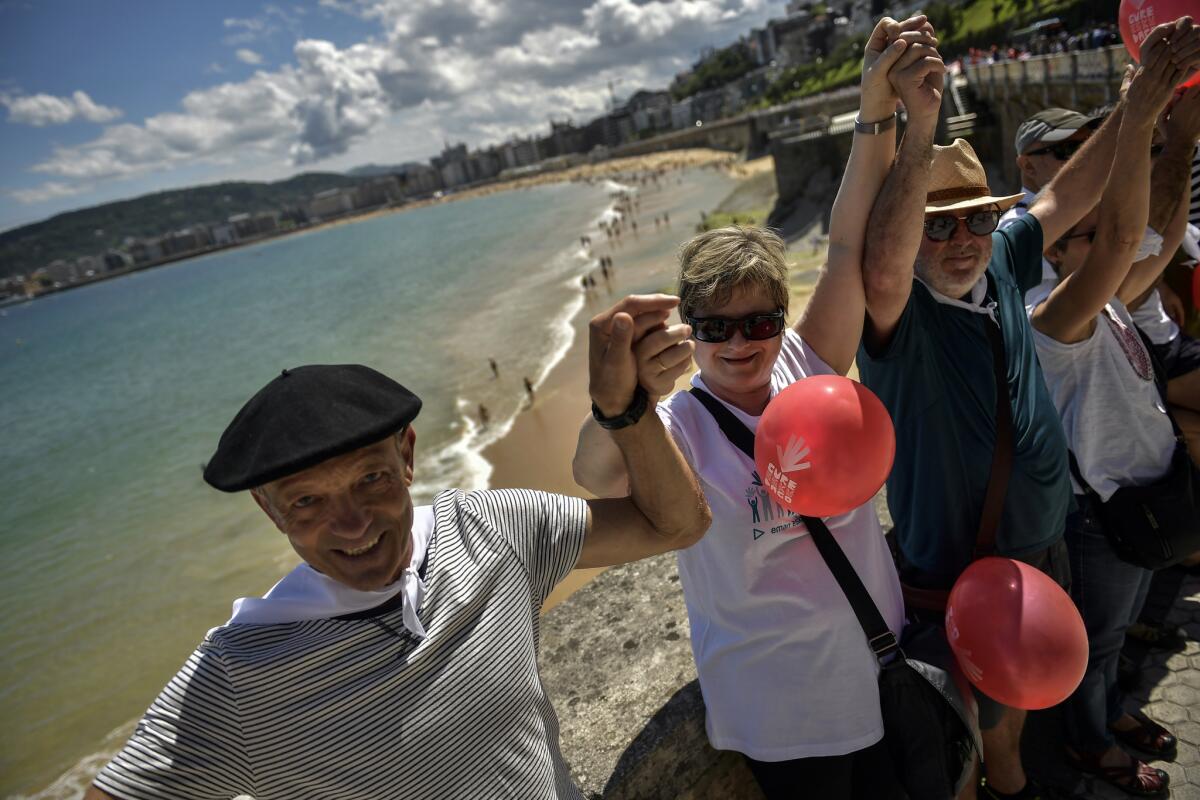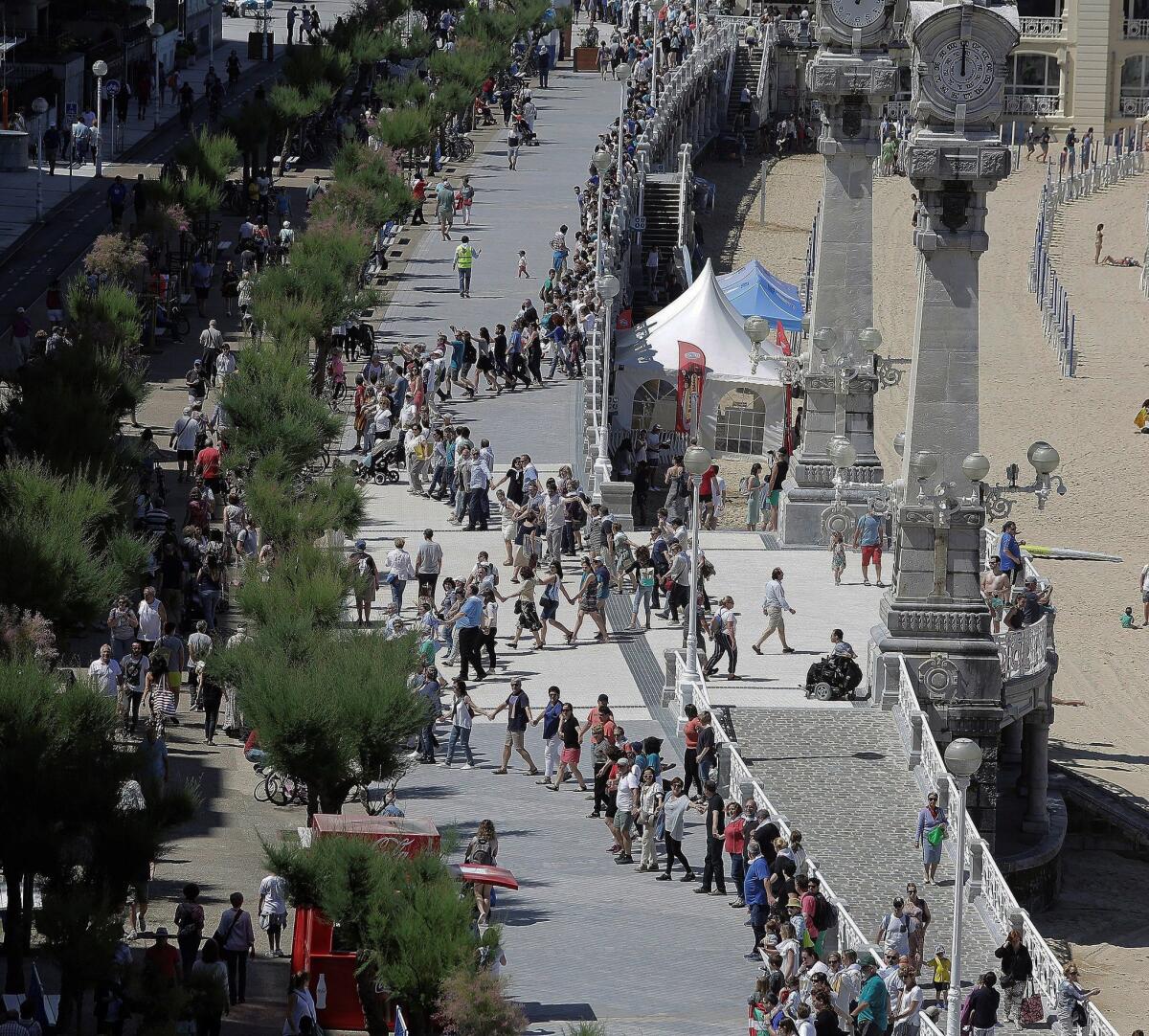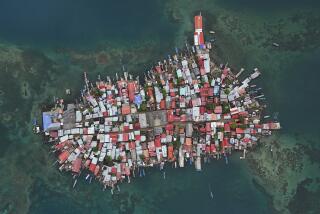With independence a far-fetched dream, Basque Country activists downsize their ambitions

Reporting from Bilbao, Spain — It seemed like the launch of another secessionist drive in Spain: Tens of thousands of people linked hands across Basque Country this month — forming a human chain that stretched 124 miles from the coastal town of San Sebastian to its capital, Vitoria — to demand a referendum on the region’s political future.
The event was part of a campaign for what activists call the “right to decide.”
That effort comes less than a year after Catalonia declared independence and the Spanish government dissolved that region’s government to quash the rebellion.
But the independence movement in Basque Country, a prosperous northern region of 2 million people, is unlikely to even get that far.
Unlike in Catalonia, a northeast region of 7 million, most residents in Basque Country oppose independence. A December poll from the University of Deusto in the Basque city of Bilbao found that just 14% of respondents wanted independence, and just 17% felt only Basque and not Spanish.
The movement brings back painful memories for many residents, because separatism has a long and bloody history in Basque Country. The separatist terrorist group Euskadi Ta Askatasuna (Basque Homeland and Freedom), better known as the ETA, killed 800 politicians, police officers and civilians between 1960 and its cease-fire with the government in 2010.
The issue is so sensitive that the politicians pushing for a referendum are intentionally vague about what it would actually ask voters or what the “right to decide” means. They tend to avoid the word “independence.”
Unilateral independence from Spain is “not viable,” said Andoni Ortuzar, the president of the Basque Nationalist Party, the dominant political force in the region and a key backer of the referendum drive.
“We have to construct the country for everyone, including for those who feel Spanish,” he said. “We don’t want a closed project, or a private club where, oh, you consider yourself Basque or no.”
His party was founded in 1895 in hopes of creating an independent state that would include part of southern France, Navarra in northern Spain, and the three provinces that make up Basque Country today.
That never materialized. But Basque Country did gain more self-rule than any of Spain’s other so-called autonomous regions.
Nationalist sentiment swelled during the long dictatorship of Gen. Francisco Franco, who banned regional languages, including Euskera in Basque Country. Basques were also forced to take Spanish names instead.

But after Franco died in 1975, the Basques received a series of benefits from the transition government.
The most important was a 1979 statute of autonomy, which laid out the governmental structure of the region and explicitly recognized the existence of a separate Basque identity.
The statute also provided Basque Country a taxation system that gives it enormous economic independence. The region collects its own taxes and determines how much to send back to the central Spanish government, depending on how much Spain has spent in the region. Nearly all other regions send all of their taxes to Spain, which redistributes the money according to the economic needs of the country.
Those changes help quell most of the support for separatism, though campaigns have periodically bubbled up. Proponents of an independent Basque Country formed a human chain in 2014 to draw attention to their cause but failed to gain any political momentum.
In an interview, Ortuzar said most people are in fact “satisfied” with the current level of autonomy. Then he contradicted himself and said they want more.
He said that while he personally favors independence, the only realistic goal for Basque Country in the short term is greater control of local institutions such as the courts.
The political situation is far different in Catalonia, which has seen a surge in support for independence over the last decade.
The independence movement there took off after a 2010 federal court decision striking down a statute that would have given the government in Catalonia greater autonomy.
Last October, the region held an independence referendum, which the central government declared illegal. Voter turnout was low, but the referendum passed.
Though the central government reasserted its control and ended the immediate crisis, the issue is far from resolved. In June, a new Catalan parliament convened under the leadership of a secessionist who promised to put Catalonia on the path to independence.
A poll in February found that 41% of Catalans supported independence.
The level of support is extremely unlikely in Basque Country for one main reason: its violent history. The Basque Nationalist Party long ago renounced the ETA, which announced last month that it was disbanding. But the tactics of the terrorist group have left many Basques unwilling to even consider independence.
For several years starting in the late 1990s, Maite Pagazaurtundua was a socialist member of the local council in the town of Urnieta and an outspoken opponent of the militants.
The ETA killed her brother, a police officer, in 2003. She faced frequent death threats and started taking taxis instead of driving her car for fear that it would be booby-trapped with a bomb.
“They wanted to kill me,” she said.
Now a member of the European Parliament, she said any talk of secession — including the “right to decide” — recalls that time and contaminates the region’s politics with a “toxic current.”
Bernhard is a special correspondent.
More to Read
Sign up for Essential California
The most important California stories and recommendations in your inbox every morning.
You may occasionally receive promotional content from the Los Angeles Times.










